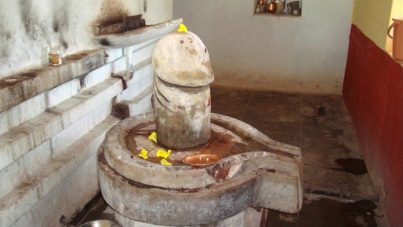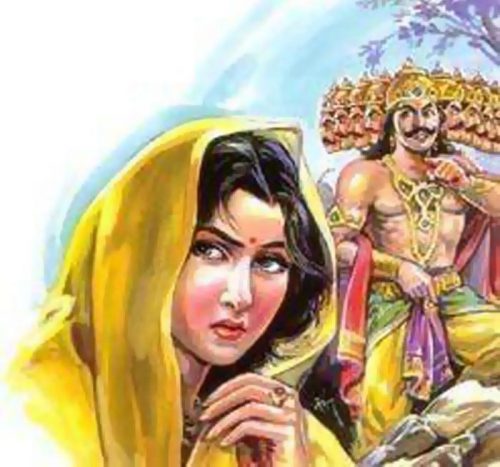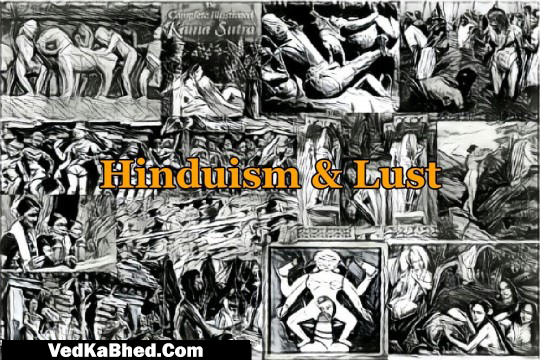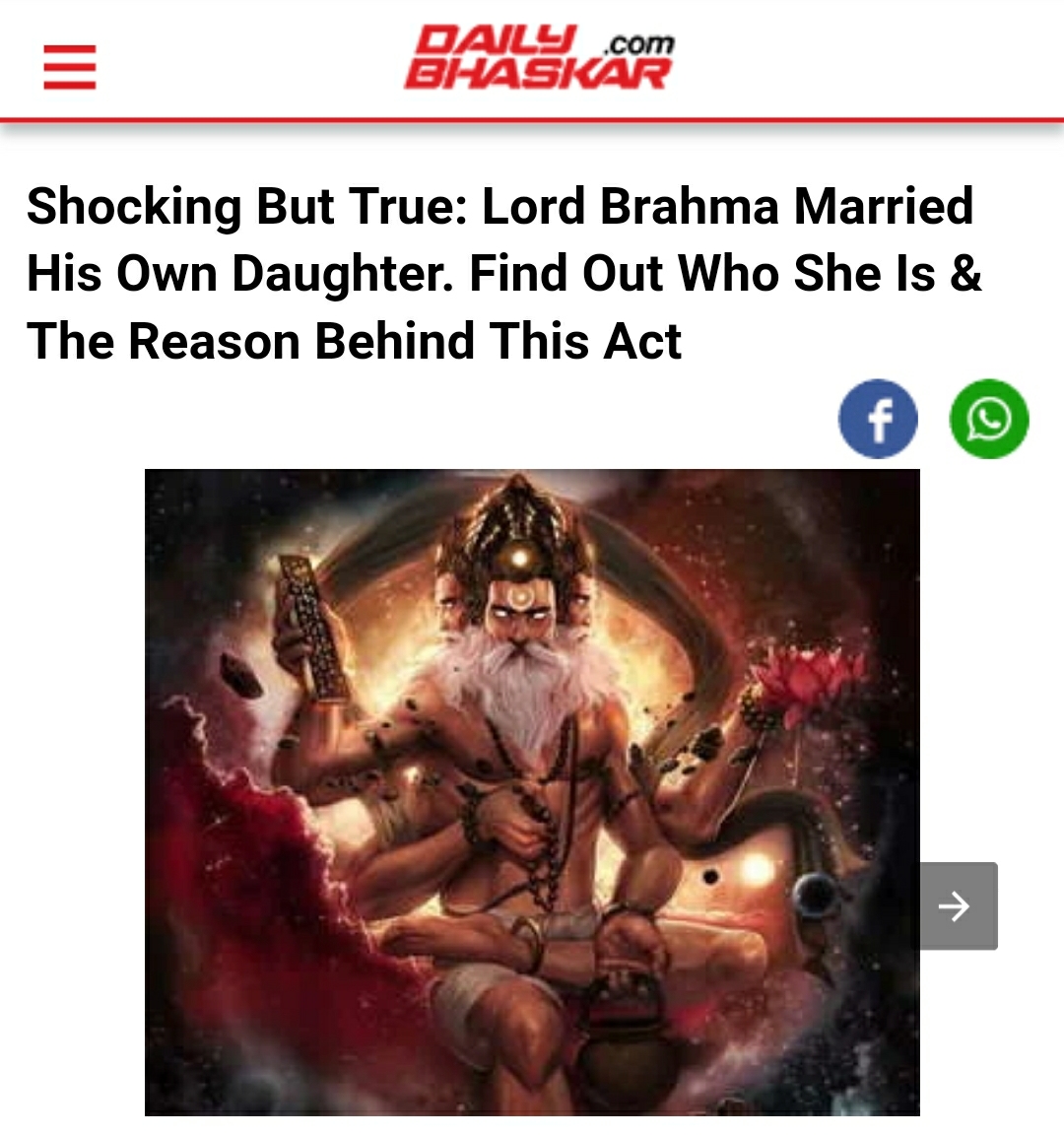Gambling in Hinduism
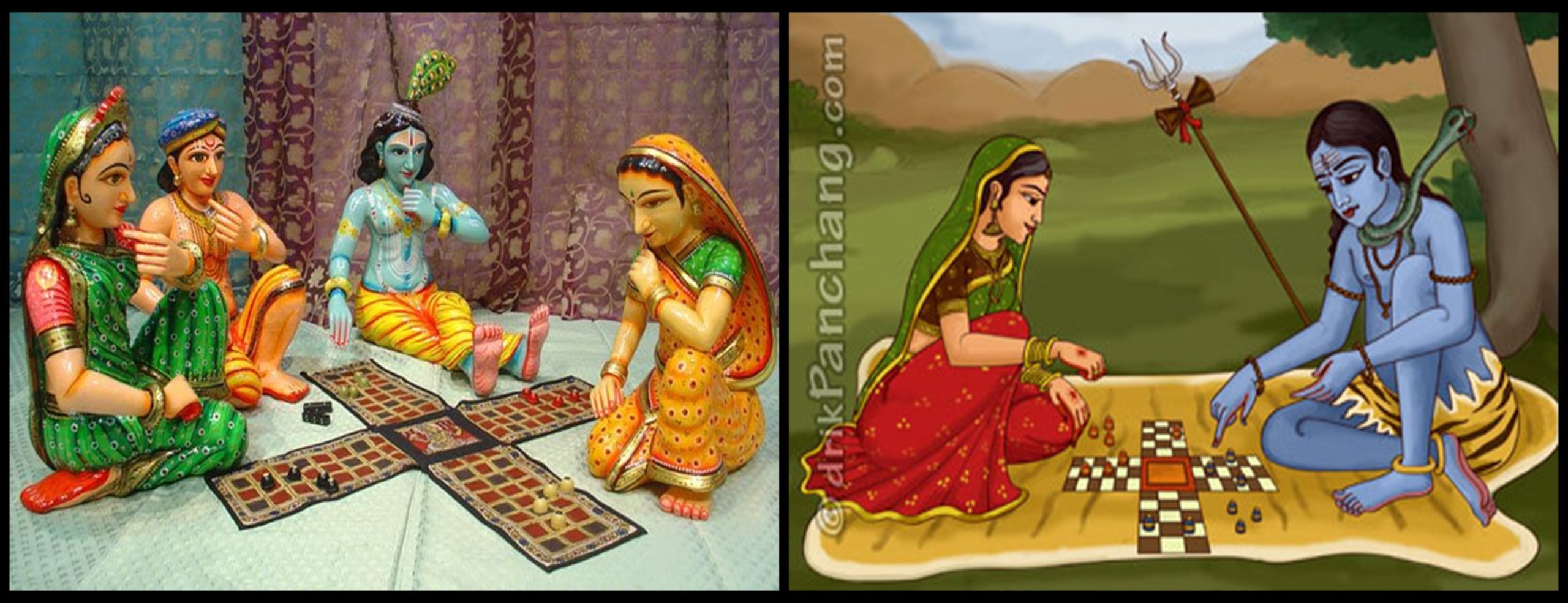

Written by Sulaiman Razvi
Gambling is a vice which leads to loss of one’s wealth, brings destruction to family and it also leads to various other evils. Gambling makes one believe in luck rather than hard work, people resort to gambling as a short cut way to gain wealth. But this evil has sanctions in the Hindu religion. Whenever we imagine Hinduism and Gambling the first thing that comes to our mind is the Mahabharata episode with Shakuni holding dice in his hand. Gambling in India is much older than the Mahabharata period, one can find mention of gambling in Vedas also. Agni Purana chapter 91 has a superstitious ritual of making gambling board and throwing dice to know the future. It was not just money, property, cow or horses which were put at stake during the play but even humans especially wives were also staked in gambling. The examples are Draupadi by Pandava and Urvashi by Indra. Gambling is not something unknown to Hindus, Hindus spend whole night playing various types of gambling during the eve of Diwali. Dr. B.R. Ambedkar wrote in his book Riddles in Hinduism, “The Aryans were a race of gamblers. Gambling was developed to science in very early days of the Aryan Civilization so much so that they had even devised certain technical terms. The Hindus used the words Krita, Treta, Dwapara and Kali as the names of the four Yugas or periods into which historical times are divided. As a matter of fact originally these are the names of the dices used by the Aryans at gambling. The luckiest dice was called Krita and the unluckiest was called Kali. Treta and Dwapara were intermediate between them. Not only was gambling well developed among the ancient Aryans but the stakes were very high. Gambling with high money stakes have been known elsewhere. But they are nothing as compared with those which are known to have been offered by the Aryans. Kingdoms and even their wives were offered by them as stakes at gambling. King Nala staked his kingdom and lost it. The Pandavas went much beyond. They not only staked their kingdom they also staked their wife Draupadi and lost both. Among the Aryans gambling was not the game of the rich. It was a vice of the many. So widespread was gambling among the Ancient Aryans that the burden of all the writers of the Dharma Sutras (Shastras?) was to impress upon the King the urgency of controlling it by State Authorities under stringent laws”.
Dr. Ambedkar also wrote, “Coming to Kali it is one of the cycles made up of four Yugas: Krita, Treta, Dwapar and Kali. What is the origin of the term Kali? The terms Krita, Treta, Dwapar and Kali are known to have been used in the three different connections. The earliest use of the term Kali as well as of other terms is connected with the game of dice. From the Rig-Veda it appears that the dice piece that was used in the game was made of the brown fruit of the Vibhidaka tree being about the size of a nutmeg, nearly round with five slightly flattened sides. Later on the dice was made of four sides instead of five. Each side was marked with different numerals 4, 3, 2 and 1. The side marked with 4 was called Krita, with 3 Treta, with 2 Dwapara and with 1 Kali.”
As Dr. Ambedkar said, four Yugas (stages of life) are named after dice throws. Dice were four sided, the side marked with 4 was called Krita, with 3 Treta, with 2 Dwapara and with 1 Kali. As per Chandogya Upanishad 4.1.4 the best throw or the winning throw was called Krita (another name for Satyayug), and the worst throw was called Kali. Chaupar form of gambling was most popular. The Sanskrit word Aksha (spelt Aksa) is generally used in Hindu text for Dice, in the Vedas dice were also called Babhru (brown) because nuts of Vibhidaka tree were used as dice in the Vedic period and later on cowries were also used while the oblong stick like dice known as Pasa were more popular. As per Rig Veda 1.41.9 a total number of four dices were used in the play and as per Satapatha Brahama 5:4:4:6 five dice were used in the play during Rajasuya ceremony. Gambling seems to have been part of amusement of the Kshatriya caste, Matsya Purana 61.32-33 states that a king Named Nimi used to play with women the game of dice, Markandeya Purana 20.1-5 mentions a king named Satrujit who ‘enjoyed himself both with gambling pastimes, and in the discipline of all kinds of weapons’.
Manu was a critic of gambling while there are various other lawmakers such as Yajnavalkya, Vasistha, Narada, Kautilya (Chanayakya)… commentators like Vijnaneswara, Haradatta who not only allowed gambling but even allowed gambling houses to run under state’s supervision. Puranas seems to be unfavourable to gambling while also providing some rituals and spells to ensure success in gambling. Same is the case with the Vedas, Rig Veda seems to censure gambling while the Atharva Veda has hymns for success in gambling. Seems like the early Aryans in Rigvedic period were averse to gambling and later developed fondness for gambling in the Atharvavedic period.
As per Gaudiya Vaishnavite (ISKCON) text, Kalidasa used to play dice in jest,
CC Antya Lila 16.6-7 “Kālidāsa was a very advanced devotee, yet he was simple and liberal. He would chant the holy name of Kṛṣṇa while performing all his ordinary dealings. When he used to throw dice in jest, he would chant Hare Kṛṣṇa while throwing the dice.”
In Kalki Purana 33.23 Kalki avatar is described as holding a conch, dice, club, lotus and bow in his hands. These two are not the only religious personalities of Hinduism who enjoyed gambling, there are other gods in Hinduism as well who enjoyed gambling very much and some were even addicted to it.
Gods Playing Game of Dice
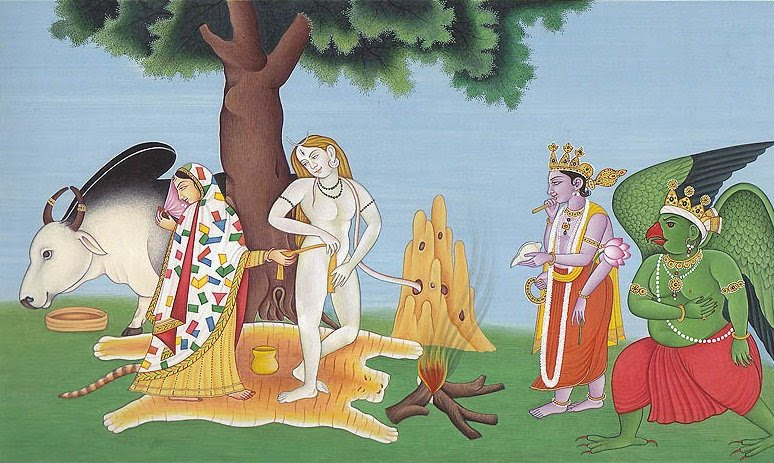
Shiva & Parvati
Have you ever wondered why Hindus gambles during their festival Diwali? Well, to learn about it you need to look it up in their texts. It is said that gambling during the day of Diwali was started by Shiva and his wife Parvati. Parvati invoked Lakshmi before the game started who seems to have helped her win the game, Shiva lost everything he had and the last stake was that he should remove his clothes, Shiva lost the last bet too and denuded himself. Parvati then declared that it is auspicious to gamble on this Pratipad, and the person who gambles on this day would mint money throughout the year,
Skanda Purana Book II, Section IV, Chapter 10, verse 20 “Sankara and Bhavani played the game of dice by way of fun formerly. Sambhu was defeated by Gauri in the game and let off naked. For that reason Sankara became miserable while Gauri was ever happy.” Tr. G.V. Tagare.
Parvati also said that gambling only on the eve of Diwali is allowed. Shiva and Parvati playing dice is also mentioned in Skanda Purana I.i.34.76 and Padma Purana VI.122.21-32 which I have mentioned below,
Padma Purana Section VI, Chapter 122, verses 21-32 “…Siva and Bhavani took to playing with dice as a sport. Laksmi, propitiated by Bhavani remained in the form of a cow. Formerly Parvati vanquished Siva in the game of dice, and sent him away naked. So this Siva is unhappy. Gauri always remains happy. He who gets victory first (passes) the year happily…On the first day, when the sun has risen, Govardhana should be worshipped in the morning and one should play the game of dice at night. Then cows should be decorated…” Tr. N.A. Deshpande
Krishna
While watching Draupadi’s Cheerharan a question may have arose in the mind that why didn’t Krishna stop it? Why didn’t he stop the Pandavas and Kauravas from gambling? Well, the answer is Krishna wasn’t just fond of women or enjoying liquor but he was also addicted to gambling. He used to gamble with his wives, concubines and friend,
Srimad Bhagavatam 10.69.19-22 “Nārada then entered the palace of another of Lord Kṛṣṇa’s wives, my dear King. He was eager to witness the spiritual potency possessed by the master of all masters of mystic power. There he saw the Lord playing at dice with His beloved consort and His friend Uddhava.” Tr. Swami Prabhupada
Srimad Bhagavatam 10.56.5 “As the people looked at Satrājit from a distance, his brilliance blinded them. They presumed he was the sun-god, Sūrya, and went to tell Lord Kṛṣṇa, who was at that time playing at dice.” Tr. Swami Prabhupada
Srimad Bhagavatam 10.66.36 “Distraught with fear, the people cried out to the Supreme Personality of Godhead, who was then playing at dice in the royal court: “Save us! Save us, O Lord of the three worlds, from this fire burning up the city!”.” Tr. Swami Prabhupada
Varaha Purana 160.52-53 “At Uttarakoti (the northern end), there is again Ganesa. Here Lord Krsna was playing dice with the Gopis. Merrily playing with them, the Lord won all of them and their wealth in the game. He gave them all to the Gopas who commemorated the event there.” Tr. Venkitasubramonia Iyer
Aniruddha the son of Krishna was also fond of gambling,
Srimad Bhagavatam 10.62.28-31 “Very agitated to hear of his daughter’s corruption, Bāṇāsura rushed at once to the maidens’ quarters. There he saw the pride of the Yadus, Aniruddha. Bāṇāsura saw before him Cupid’s own son, possessed of unrivaled beauty, with dark-blue complexion… As He sat opposite His most auspicious lover, playing with her at dice, there hung between His arms a garland of spring jasmines that had been smeared with kuṅkuma powder from her breasts when He had embraced her. Bāṇāsura was astonished to see all this. Seeing Bāṇāsura enter with many armed guards, Aniruddha raised His iron club and stood resolute, ready to strike anyone who attacked Him.
Balrama
Balarama is sometime considered an avatar of Vishnu. As per Hindu text, Balarama was addicted to gambling. Balarama is said to have played dice with Rukmi the brother in law of Krishna. It is said that Rukmi wanted to avenge the elopement of his sister Rukmini by Krishna so he challenged Balarama the brother of Krishna in the game of dice who accepted it without hesitation though he wasn’t an expert at it. Balarama lost many bets to Rukmi but won the final bet which was very big. Then an argument ensued between Rukmi and Balarama that Balarama had cheated him (Rukmi) and that Rukmi is the real winner. Balarama couldn’t tolerate this so he killed Rukmi for such petty argument,
Srimad Bhagavatam 10.61.27- “After the wedding, a group of arrogant kings headed by the King of Kaliṅga told Rukmī, “You should defeat Balarāma at dice. He’s not expert at dice, O King, but still He’s quite addicted to it.” Thus advised, Rukmī challenged Balarāma and began a gambling match with Him. In that match Lord Balarāma first accepted a wager of one hundred coins, then one thousand, then ten thousand. Rukmī won this first round, and the King of Kaliṅga laughed loudly at Lord Balarāma, showing all his teeth. Lord Balarāma could not tolerate this. Next Rukmī accepted a bet of one hundred thousand coins, which Lord Balarāma won. But Rukmī tried to cheat, declaring “I’m the winner!”.” Tr. Swami Prabhupada
Same is repeated in Brahma Purana 92.11-22 and also mentioned in Vishnu Purana,
Vishnu Purana 5.23.10-28 “After the wedding had been solemnized, several of the kings, headed by him of Kalinga, said to Rukmin, “This wielder of the ploughshare is ignorant of the dice, which may be converted into his misfortune: why may we not contend with him, and beat him, in play?” The potent Rukmin replied to them, and said, “So let it be:” and he engaged Balaráma at a game of dice in the palace. Balaráma soon lost to Rukmin a thousand Nishkas: he then staked and lost another thousand; and then pledged ten thousand, which Rukmin, who was well skilled in gambling, also won. At this the king of Kalinga laughed aloud, and the weak and exulting Rukmin grinned, and said, “Baladeva is losing, for he knows nothing of the game; although, blinded by a vain passion for play, he thinks he understands the dice.” Halayudha, galled by the broad laughter of the Kalinga prince, and the contemptuous speech of Rukmin, was exceedingly angry, and, overcome with passion, increased his stake to ten millions of Nishkas. Rukmin accepted the challenge, and therefore threw the dice. Baladeva won, and cried aloud, “The stake is mine.” But Rukmin called out as loudly, that he was the winner. “Tell no lies, Bala,” said he: “the stake is yours; that is true; but I did not agree to it: although this be won by you, yet still I am the winner.” A deep voice was then heard in the sky, inflaming still more the anger of the high-spirited Baladeva, saying, “Bala has rightly won the whole sum, and Rukmin speaks falsely: although he did not accept the pledge in words, he did so by his acts (having cast the dice).” Balaráma thus excited, his eyes red with rage, started up, and struck Rukmin with the board on which the game was played, and killed him… When Krishńa heard that Rukmin had been killed by his brother, he made no remark, being afraid of Rukminí on the one hand, and of Bala on the other…” Tr. H.H. Wilson
Indra
Indra the king of all gods staked Urvashi in gambling with Pramati,
Brahma Purana, Gautami Mahatmya 101.9-12 “Indra said to Pramati: ‘In the same manner, give as requital your virtuous right hand along with its protecting cover as well as arrows. We shall gamble.’ After entering into an agreement like this both of them began to play at dice. Pramati won the stake, viz., Urvasi, the divine damsel. After winning her Pramati said to Indra audaciously. Pramati said: (Offer) something else as requital. I shall then, O lord, play at dice with you. Indra said: O king, (I offer as stake) the thunderbolt worthy of Devas and the excellent chariot famous for having been used in various campaigns.” Tr. Board of Scholars, edited by J.L. Shastri
Hindu Scriptures on Gambling
Some Hindu texts not just allows gambling but even legalises gambling houses and levies tax on it, the winner must also set aside a portion of the gains for the king. The gambling houses are regulated by the state and there must also be a superintendent of the gaming house supervising the game. In case there is a dispute between two parties, then either the superintendent or other gamblers must settle the dispute and in case if other gamblers are enemies of either party then the dispute is to be settled by the king. Some text says that the gamblers needs to take permission for gambling from the king, in case he plays without government’s permission then he is punished by the authority. There are also strict rules set by the authority, those who cheat in gambling are punished severely by the state and sometimes they are even banished from the state.
Swami Prabhupada the founder of ISKCON implied that gambling is permissible for Kshatriyas,
“A kṣatriya is not supposed to refuse to battle or gamble when he is so invited by some rival party…” Swami Prabhupada on Gita 1.37-38 http://www.vedabase.com/en/bg/1/37-38
Yajnavalkya Smriti Chapter II, Verses 199-203 “The keeper of a gambling-house shall take from a gambler five per cent. When the wager is a hundred [panas or upwards], and ten per cent, in other cases. Being well protected [by the king], he shall give the promised share [of his gains] to the king; he shall recover the wager, and pay it to the winner, [and] being over patient, [shall speak] the truth. [Payment of] that which has been won publicly in an assembly of gamesters in the presence of the master of a gaming house, and when the king’s share has been paid, shall be enforced, but not otherwise. The superintendents and witnesses in [gaming] transactions [should be] gamblers themselves. A man who plays with false dice, or by deceit, shall be branded and banished by the king. Gaming should be allowed under one supervision, as being a means of detecting thieves. This very law should be understood to apply in the case of Samahvaya [prize-fighting].” Tr. Vishwanath Narayan Mandlik
Vijnanesvara in his Mitakshara comments on the above verses, “The officer of the gambling house, for whom provision has thus been made-he being protected from rogues and gamesters by the king-shall pay to the king a portion as agreed upon. Similarly, he should recover the amount of the wager i.e., should recover it from the losing party, by accepting a pledge or by arrest etc. And having recovered that amount, he, the keeper, should pay it to the winner i.e., the successful party. Also, being (ever) patient, he should always declare a true decision to the gamblers. That has been stated by Narada: ‘The master of the gaming house shall arrange the game, and pay the stakes won therein’.”
As mentioned in Legal and Constitutional History of India: Ancient, Judicial and Constitutional System, p.212, by Rama Jois, Published by Universal Law Publishing, 2004.
Apastamba Dharma Shastra, Prasna 2, Patala 10, Khanda 25, verses 12-13 In the midst of the assembly-house, (the superintendent of the house) shall raise a play-table and sprinkle it with water, turning his hand downwards, and place on it dice in even numbers, made of Vibhîtaka (wood), as many as are wanted. Men of the first three castes, who are pure and truthful, may be allowed to play there.
Commenting on Apastamba, Haradatta says that Gambling should be played in gambling house only, and the king is supposed to punish those who play it elsewhere. Translator of Apastamba Dharma Shastra also quoted commentary of Hindu scholar Haradatta in footnotes, Haradatta wrote,
“Having played there, they shall give a fixed sum to the gambling-house keeper and go away. The latter shall, every day or every month or every year, give that gain to the king. And the king shall punish those who play elsewhere or quarrel in the assembly-house”
http://sacred-texts.com/hin/sbe02/sbe0260.htm
Narada declares gambling to be lawful amusement, when carried on in a public gaming-house with prior permission of the king.
Narada Smriti 18.2-8 The master of the gaming-house shall arrange the game and pay the stakes which have been won; the profit of such a conductor of games shall amount to ten percent. When the dice on being thrown fall twice in a game at dice, those acquainted with (playing at) dice allot the victory to the adversary and the defeat to the gambler. When a dispute has arisen among gamblers, let (other) gamblers be appealed to; they shall act both as judges and as witnesses in a dispute of this sort. No gambler shall ever enter into another gaming-house before having paid his debt; he must not disobey the master of the gaming-house, and must pay of his own accord what he owes to him. Wicked men who play with false dice shall be driven out of the gaming-house, after a wreath of the punishment ordained for them. If a man gambles with dice, without authorization from the king, he shall not get his stake, and shall have to pay a fine. Or let the gamblers pay to the king the share due to him and play in public, thus no wrong will be committed.
Brihaspati mentions why Manu prohibits gambling and then mentions rules for gamblers and gambling houses,
Brihaspati Smriti 26.1-8 “Gambling has been prohibited by Manu, because it destroys truth, honesty, and wealth. It has been permitted by other (legislators) when conducted so as to allow the king a share (of every stake). It shall take place under the superintendence of keepers of gaming-houses, as it serves the purpose of discovering thieves. The same rule has to be observed in bets on prize-fights with animals…A wager (or game) shall be made in public; false gamblers shall be banished. When there is a point at issue between the two parties (in a game or wager, other) gamblers shall examine (and decide) the matter; if they are enemies (of either party), the king shall decide the dispute…The keeper of the gaming-house shall receive the stakes and pay the victorious gambler and the king; he shall also act as witness in a dispute, assisted by three other gamblers.
Katyayana Smriti verse 935-943 “If it (gambling) has to remain (has to be allowed) he (the king) should allow it to be done openly with an (ornamental) arcch erected near the door (of the gambling hall) in order that respectable people may not mistaken (about its real nature) and he should make it yield revenue (tax). The keeper of the gaming house should make the gambling go on and should himself pay to the king (the latter’s) dues. He (the keeper) should take from the defeated party ten percent as his profit. The keeper should give to the winner his money (out of his own pocket) and he should recover from the defeated gambler within three fortnights or at once; there is no doubt (about this rule). Where (the throw) of a man playing with dice in gambling is the same or double (of the previous throw) there the (former) gambler is the winner and his protection (from the other gamblers) is to be arranged for. Or the gambler (himself), after giving to the king his share (of revenue) as declared, should carry on gambling openly. In this way he will be guilty of no fault. The keeper of the gaming house should make the defeated gambler forcibly pay what (the defeated) has to pay in the same place (i.e. in the gaming hall) and not elsewhere; since the procedure (in gambling matters) entirely rests with the keeper of the gaming house. A person ignorant (of gambling) if defeated (in gambling) should be released (from his liability), but one who knows gambling should not be released if he is defeated in secret (gambling); when one knowing gambling has lost his all (in a wager), he should not be made to pay his all. In disputes (among gamblers), in (deciding on) victory, in the matter of the gain (to the winner), and as regards the means (i.e. dice) of those who are (alleged to be) playing with false dice, the keeper of the gaming house, if he is honest, is the final authority.” Tr. P.V. Kane
Kautilya’s Arthashastra allows gambling and states that it could be helpful to identify thieves as there is more possibility of thieves coming in gambling-hall to try their luck with stolen money, other than that it also states how much percentage the superintendents should charge from winners and those who cheat in the play,
Kautilya Arthashastra, Book 3, Chapter 20, Verses 12-14 “With a view to find out spies or thieves, the Superintendent of gambling shall, under the penalty of a fine of 12 panas if played elsewhere, centralise gambling…The Superintendents of gambling shall, therefore, be honest and supply dice at the rate of a kakani of hire per pair. Substitution by tricks of hand of dice other than thus supplied shall be punished with a fine of 12 panas. A false player shall not only be punished with the first amercement and fines leviable for theft and deceit, but also be made to forfeit the stakes he has won. The Superintendent shall take not only 5 per cent of the stakes won by every winner, and the hire payable for supplying dice and other accessories of dice play, but also the fee chargeable for supplying water and accommodation, besides the charge for license…” Tr. R. Shamasastry
Other than the Smritis the Purana also sets guidelines for gambling. Matsya Purana gives guidelines to servant of the state,
Matsya Purana 216.8 “In course of gambling and at the game of dice one should show his skill to the king but make the latter win.” Tr. Taluqdar of Oudh, edited by B.D Basu
Agni Purana allows gambling with prior permission of the king and also states the amount of fine and punishment to those who cheat in gambling,
Agni Purana 253.13-30 “…Gambling (divine) consists in playing with dice, rods and Vajra, while the play known as human gambling consists in playing the game, known as the Panchakrida. A non-conformity to the king’s law or an act in direct contravention of a royal edict or order, constitutes an offence…” Tr. M.N. Dutt
Agni Purana 257.47-53 “In duels or in gambling, the king shall receive five percent., of the fine imposed, while the king’s due is ten percent., on all fines realised from cheats and swindlers. Witnesses wilfully perjuring themselves in courts of justice, or gamblers winning any stake by foul play, should be banished from the country, branded with the insignia of the king.” Tr. M.N. Dutt
Dice was also played as part of the Rajasuya ceremony which is the consecration ceremony of the king, although it’s not actually gambling but seems to be ritualistic play,
Satapatha Brahmana 5:4:4:6-23 He then throws the five dice into his hand, with (Vâg. S. X, 28), ‘Dominant thou art: may these five regions of thine prosper!’–now that one, the Kali, is indeed dominant over the (other) dice, for that one dominates over all the dice: therefore he says, ‘Dominant thou art: may these five regions of thine prosper!’ for there are indeed five regions, and all the regions he thereby causes to prosper for him…Thereupon the tribesman and the Pratiprasthâtri, with that sacrificial sword, prepare the gaming-ground, (close) by the original fire, with the puroruk verse of the Sukra. The Sukra is the eater: he thereby makes (him) the eater…The Adhvaryu then takes clarified butter in four ladlings, places a piece of gold on the gaming-ground, and offers with (Vâg. S. X, 29), ‘May ample Agni, the lord of rites, delighted,–may ample Agni, the lord of rites, accept of the butter, hail!’ He (the Adhvaryu) throws down the dice, with, ‘Hallowed by Svâhâ, strive ye with Sûrya’s rays for the middlemost place among brethren!’ For that gaming-ground is the same as ‘ample Agni,’ and those dice are his coals, thus it is him (Agni) he thereby pleases; and assuredly in the house of him who offers the Râgasûya, or who so knows this, the striking 1 of that cow is approved of. On those dice he says, ‘Play for the cow!’ The two draught oxen of the original (hall-door) fire are the sacrificial fee.
Satapatha Brahmana 5:3:1:10 And on the following day, having brought together gavedhukâ (seeds) from the houses of the Keeper of the dice (akshâvâpa) and the Huntsman (govikartana), he prepares a gavedhukâ pap for Rudra at the house of him who is consecrated. These two, while being two jewels (of the king), he makes one for the purpose of completeness. And as to why he performs this offering,–Rudra is hankering after that (cow) which is killed here in this hall; now Rudra is Agni (fire), and the gaming-board being fire, and the dice being its coals, it is him (Rudra) he thereby pleases. And verily whosoever, that knows this thus, performs the Râgasûya, in his house that approved (cow) is killed. And he, the keeper of dice, and the huntsman, are (each of them) assuredly one of his (the king’s) jewels: it is for these two that he is thereby consecrated, and these two he makes his own faithful followers. The sacrificial fee for this (jewel) is a bicoloured bullock–either one with white fore-feet, or a white-tailed one,–a claw-shaped knife, and a dice-board with a horsehair band; for that is what belongs to those two.
Eggeling wrote, “In Taitt. Br. I, 7, 10 the game at dice, at the Râgasûya, is referred to as follows:–With, ‘This king has overcome the regions,’ he hands (to the king) five dice; for these are all the dice: he thereby renders him invincible. They engage (to play) for a dish of rice (odana), for that is (a symbol of) the chief: he thus makes him obtain every prosperity. He addresses them (with the epithets of) ‘far-famed, most prosperous, true king.’ The Commentary and Sûtras then supply the following explanations:–The keeper of the dice (akshâvâpa), having (marked off and) raised the gambling-ground (by means of the wooden sword), and sprinkled it, throws down more than a hundred–or more than a thousand–gold dice. From them he takes five dice and hands them to the king: these, as representing the five regions, are taken to include all those dice.”
Charm/Talisman/Ritual to secure success in Gambling
Hindu texts even gives instructions on how to ensure success in gambling, it provides various spells, talismans and rituals to secure success in gambling.
Skanda Purana VII.I.345.1-3 “Thereafter, O great goddess, one should go to the Linga Hatakesvara situated at a distance of one hundred eighty Dhanus to the east of Jaradgavesvara. Knowing that it is an excellent Kestra, a Linga called Nalesvara was installed by Nala along with Damayanti. Visiting it and by worshipping it as per procedure, O goddess, a being (man) is freed from Kali and becomes victorious in gambling.” Tr. G.V. Tagare
Agni Purana 259.76-80 “…a man should mentally recite the Rik, running as ‘Prabeyam, etc.’ By reciting the Rik, running as Ma ‘Pragama, etc.,’ in the morning and with the rise of the god of day, a man is sure to win in gambling, or to find out a path…” Tr. M.N. Dutt
Agni Purana 312.22-25 “The above-said mystic diagram, bedecked with the marks of thunder-bolt, delineated in Rochona on a piece of Bhruja bark, and put in an amulet of gold, should be worn round the arm, by which all evils that would otherwise have invaded the body, would be averted. Such an amulet is a safe-guard against death, brings good luck to the wearer of such an amulet, is sure to return victorious from a battle, or from a gambling table…” Tr. M.N. Dutt
Agni Purana lists some drugs and states that by wearing cloth smeared with certain drugs a man shall surely win in gambling,
Agni Purana 139.14-17 “…A man is sure to win in a game of dice by putting on a cloth besmeared with the seventh, tenth, eighth and the ninth drugs of the above-said list…” Tr. M.N. Dutt
Apastamba Dharma Shastra 2.7.16.7-13 (A funeral-oblation) offered on any day of the latter half of the month gladdens the Manes. But it procures different rewards for the sacrificer according to the time observed…(If he performs it) on the fifth day, sons (will be born to him). He will have numerous and distinguished offspring, and he will not die childless. (If he performs it) on the sixth day, he will become a great traveller and gambler.
Narada Purana III.68.56-58 “The idol of Ganesa is to be made of ivory, or of a margosa tree (branch) broken by a monkey or an elephant or of a white arka plant. After installing prana in it and invoking Ganesa there and worshipping him properly when the moon is in eclipse, he should touch it without taking any food and should carry it in the sikha (the sacred hair on the hair). Thereby he shall be victorious in gambling, battles and legal disputes.” Tr. G.V. Tagare
Narada Purana III.74.186-191 “I shall clearly recount the yantra of Hanuman that is extremely protective and in power. He shall draw the diagram of a lotus with eight petals. In the pericarp the name of the sadhya (the person intended) shall also be written. After inscribing an octagon in the petal, he shall envelop it with the Malamantra (a garland of mantras). After enveloping its exterior with the Maya he shall perform the pranapratistha rite (installation of the vital breath). The yantra shall be written in an excellent birch bark with a golden pen immersed in saffron and yellow pigment Rocana. The yantra shall be enclosed with three meters. The devotee shall wear this yantra strenuously achieved, either on his arm or on his head. He shall be victorious in the battle, in the game of dice, in arguments as well as in discussions…” Tr. G.V. Tagare
Narada Purana III.87.29 “By meditating on the goddess and repeating the mantra, the repeater attains victory in the game of dice, in the forest, at the palace door, in the battle and during emergency brought about by the enemies.” Tr. G.V. Tagare
It’s not just the Puranas and Shastra which gives these details. There are dedicated hymns in Atharva Veda to ensure success in gambling. Mostly the Apsaras were invoked during prayers for success in gambling. There are total number of 4 hymns with various other verses dedicated for ensuring success in gambling,
Atharva Veda 4.38.1-4 “Hither I call the Apsaras, victorious, who plays with skill, Her who comes freely fort to view, who wins the stakes in games of dice. Hither I call that Apsaras who scatters and who gathers up. The Apsaras who plays with skill and takes her winnings in the game. Dancing around us with the dice, winning the wager by her play. Hither I call that Apsaras, the joyous, the delightful one—Those nymphs who revel in the dice, who suffer grief and yield to wrath.” Tr. Ralph T.H. Griffith
Another English translation,
Atharva Veda 4.38.1-4 “The successful, victorious, skilfully gaming Apsarâ, that Apsarâ who makes the winnings in the game of dice, do I call hither. The skilfully gaming Apsarâ who sweeps and heaps up (the stakes), that Apsarâ who takes the winnings in the game of dice, do I call hither. May she, who dances about with the dice, when she takes the stakes from the game of dice, when she desires to win for us, obtain the advantage by (her) magic! May she come to us full of abundance! Let them not win this wealth of ours! The (Apsarâs) who rejoice in dice, who carry grief and wrath-that joyful and exulting Apsarâ, do I call hither.” Tr. Maurice Bloomfield
Another English translation,
Atharva Veda 4.38.1-4 “The up-shooting, all conquering, successfully-playing Apsaras, that wins (kr) the winnings in the pool (?glaha) that Apsaras I call on here. The distributing (vi-ci), on strewing (a-kir), successfully-playing Apsaras, that seizes (grah) the winnings in the pool that Apsaras I call on here. She who dances about with the dice (?aya), taking to herself the winning from the pool let her, trying to gain (?) for us the winnings, obtain the stake (?praha) by magic (maya); let her come to us rich in milk; let them not conquer from us this riches. She who delights (pra-mud) in the dice (aksa), bringing (bhr) pain and anger the rejoicing, the delighting one: that Apsaras I call on here.” Tr. William Dwight Whitney
Following is the Hindi translation by Dr. Ganga Sahay Sharma,
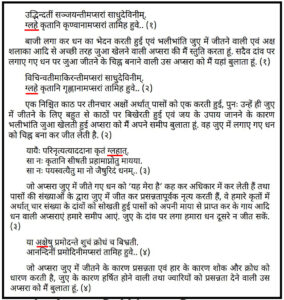
The Sanskrit word mentioned is Glaha (ग्लह) which means Gambling, it also denotes a place where the dice is thrown i.e., a gambling board and it also denotes stake (in gambling). The verses also uses the word Aksha (Aksa) which means dice. Following is the snapshot of the definition of the word Glaha from V.S. Apte’s lexicon,
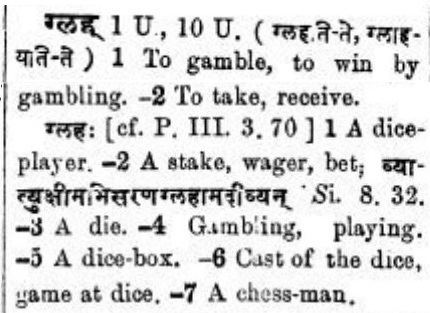
[The Practical Sanskrit-English Dictionary, p.474, by Vaman Shivaram Apte, Published by Shiralkar, Poona, 1890]
One can also check it in online dictionary. Panini also defines the word as,
Asthadhyaya Panini, Book III, Ch III, Verse 70 “The word ‘glaha’ is irregularly formed, when the sense of the root refers to gambling.”
Various other Sanskrit words like Div, Dev, Dyut, Ghrt… are also used in Vedas for gambling. Another hymn which is a prayer for success in gambling reads as,
Atharva Veda 7.109.1-7 “My homage to the strong, the brown, the sovran lord among the dice! Butter on Kali I bestow: may he be kind to one like me. Bear butter to the Apsarases, O Agni, and to the Dice bear dust and sand and water…Evil be mine opponent’s luck! Sprinkle thou butter over us. Strike, as a tree with lightning flash, mine adversary in the game. The God who found for us this wealth for gambling, to cast the dice and count the winning number…As I invoke the Gods at need, as I have lived in chastity, May these, when I have grasped the Dice, the brown, be kind to one like me.” Tr. Ralph T.H. Griffith
Another English translation,
Atharva Veda 7.109.1-7 “This homage to the formidable brown one, who among the dice is self-controller; with ghee do I aid (?) Kali; may he be gracious to us in such plight. Do thou, O Agni, carry ghee for the Apsarases, dust for the dice, gravel and waters; enjoying in their respective shares the oblation-giving, the gods revel in both kinds of oblations…Let them make the rival gambler subject to me. Ill luck (?) to the opposing player; do thou shed upon us with ghee; smite thou him who plays against us as a tree with a thunderbolt. He who made this riches for our playing, who the taking (?) and leaving of the dice that god, enjoying this libation of ours…If (yat) a supplicant I call on the gods, if we have dwelt in Vedic studentship, if I take up the brown dice let them be gracious to us in such plight.” Tr. William Dwight Whitney
Following is the Hindi translation of Atharva Veda 7.109.1-7 by Dr. Ganga Sahay Sharma,
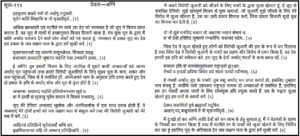
4th verse of Atharva Veda mentioned above is elaborated in Kausiki Sutra 41.13, Following is the snapshot of Hindi translation with Sanskrit text by Uday Narayan Singh,

Atharva Veda Kanda 7, Adhyaya 50 is a gambler’s prayer for success in gambling,
Atharva Veda 7.50.1-9 “As evermore the lightning flash strikes, irresistible, the tree, So, irresistible, may I conquer the gamblers with the dice…Yea, by superior play one gains advantage: in time he piles his spoil as doth a gambler…I would that I were winner of cattle and horses, wealth and gold. Dice, give me play that bringeth fruit as ’twere a cow with flowing milk! And, as the bowstring binds, the bow, unite me with a stream of gains.” Tr. Ralph T.H. Griffith
Another English translation of the first verse,
Atharva Veda 7.50.1 “As evermore the irresisstible lightning flash strikes the tree so irresistible, may I conquer the gamblers with the dice.” Tr. Acharya Vaidyanath Shastri
Another English translation,
Atharva Veda 7.50.1-9 “As the lightning at all times smites irresistibly the tree, thus would I to-day irresistibly beat the gamesters with my dice! Whether they be alert, or not alert, the fortune of (these) folks, unresisting, shall assemble from all sides, the gain (collect) within my hands… Even the strong hand the bold player conquers, as the skilled gambler heaps up his winnings at the proper time. Upon him that loves the game (the god), and does not spare his money, (the game, the god) verily bestows the delights of wealth… Gain is deposited in my right hand, victory in my left. Let me become a conqueror of cattle, horses, wealth, and gold! O dice, yield play, profitable as a cow that is rich in milk! Bind me to a streak of gain, as the bow (is bound) with the string!” Tr. Maurice Bloomfield
Another English translation,
Atharva Veda 7.50.1-9 “As the thunderbolt always strikes the tree irresistibly, so may I today smite [badh, vadh] the gamblers irresistibly with the dice. Of the quick, of the slow, of the people that cannot avoid it (?) let the fortune come together from all sides, my winnings in hand…My winnings in my right hand, victory in my left is placed; kine-winner may I be, horse-winner, riches-winning, gold-winner. O ye dice, give [me] fruitful play, like a milking cow; fasten me together with a stream (?) of winnings, as a bow with sinew.” Tr. William Dwight Whitney
Following is the Hindi translation by Dr. Ganga Sahay Sharma,
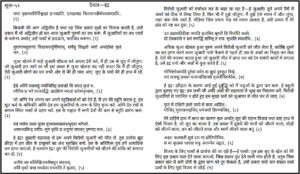
The 9th verse is addressed to Aksha (spelt Aksa) which means dice. Another hymn 2 of Kanda 2 of Atharva Veda is also a charm for success in gambling,

Atharva Veda 2.2.5 “Haunters of darkness, shrill in voice, dice-lovers, maddeners of the mind To these have I paid homage, the Gandharva’s wives, Apsarases.” Tr. Ralph T.H. Griffith
Following is a prayer to remove spell that is cast on dice and gambling board, the word Adhidevana means gambling board and this word also appears in Satapatha Brahmana 5:4:4:20, and Aksha means dice,
Atharva Veda 5.31.6 “I strike back on them their harmful artificial device which they use in assembly, which they use in play and which they use upon dice.” Tr. Acharya Vaidyanath Shastri
Another English translation,
Atharva Veda 5.31.6 “The spell that they have cast upon thy public room thy gambling-board, Spell they have cast upon thy dice, this I strike back again on them.” Tr. Ralph T.H. Griffith
Another English translation,
Atharva Veda 5.31.6 “What [witchcraft] they have made for thee in the assembly (sabha), what they have made at the gambling-board; in the dice what witchcraft they have made I take that back again.” Tr. Maurice Bloomfield
Following is the Hindi translation by Dr. Ganga Sahay Sharma,

